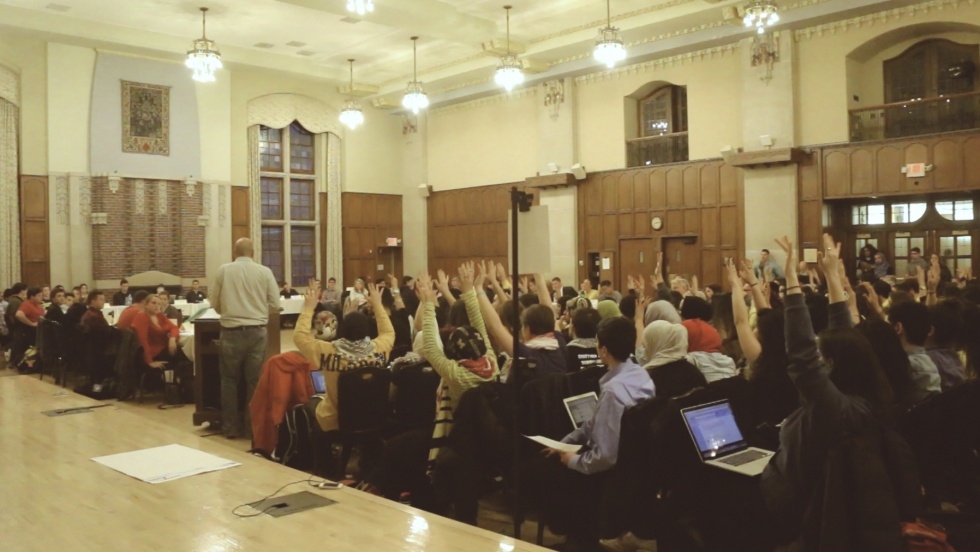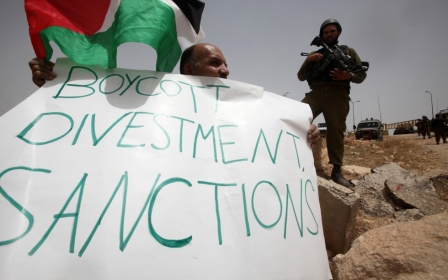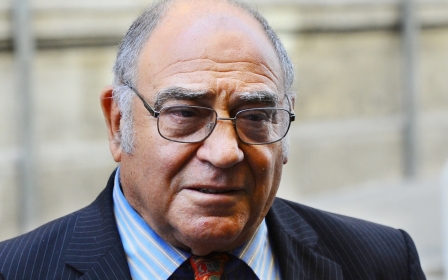University of Michigan divestment vote fails after hours of debate

ANN ARBOR, Michigan - The student government at the University of Michigan (UM) late Tuesday voted against a resolution on divestment from companies complicit in the violation of Palestinian human rights.
After more than four hours of debate and proceedings in front of an audience of hundreds of students, Central Student Government (CSG) brought the resolution to a vote. The bill garnered 15 yes votes and 29 opposed, with one abstention - six more votes in favour than a similar divestment resolution brought to CSG a year before.
The authors of the resolution, the group Students Allied for Freedom and Equality (SAFE), called for the creation of an ad-hoc committee by UM’s Board of Regents to investigate the possibility of divestment from four companies involved in Israeli human rights violations.
Had the bill passed, UM would have been at least the fifth US university to approve such a resolution in 2015 amid a growing nationwide divestment movement.
Following the resolution’s defeat, CSG representatives who supported the resolution expressed their concern with the outcome of the vote.
“The issue we were asked [about] was for a minority population on this campus - which is an overwhelming issue for this campus on any minority - to have their voices acknowledged by the regents,” CSG rep Michael Chrzan said.
“If minority voices being acknowledged at the University of Michigan is a cause for dissent, we need to greatly re-examine our position in this world as a public institution.”
Major stir
Last year’s divestment vote caused a major stir on UM’s campus, resulting in widespread media coverage in Michigan and beyond. In March 2014, CSG initially voted to indefinitely table the resolution without bringing it to a vote, angering pro-divestment students who chanted the CSG meeting to an abrupt close. SAFE then staged a week-long sit-in in CSG’s chambers, complaining that the student leadership had silenced them. The protest led to an apology by several CSG reps, who brought the resolution to a vote the following week. It failed 25 to nine, with five abstentions.
“I was actually [feeling] pretty positive about the number of yes votes we got this year compared with last year’s resolution,” SAFE’s Devin Jones told Middle East Eye.
He added that SAFE would definitely be working on another divestment resolution next year.
A student group opposing the resolution, Wolverines For Peace, did not respond to MEE’s request for comment.
For and against
In SAFE’s introduction of its bill, the authors called for the university to rethink its investments in Boeing, Caterpillar, G4S and United Technologies.
SAFE argued that these companies profit from Israeli violations of Palestinian human rights, supplying the means for air raids that cause numerous civilian casualties, bulldozers that destroy Palestinian homes and build illegal Israeli settlements, and prison systems where Palestinians are mistreated.
While students opposing the resolution argued that it would constitute UM choosing sides on the Israeli-Palestinian issue, SAFE argued that by investing in the four companies in question, the university had already chosen a side.
“When our university invests in these companies, we as students and members of the university are saying yes, these human rights abuses are OK; yes, these lives do not matter; and yes, profit is more important than human rights and human lives,” the Michigan Daily quoted student Marianna Yamamoto as saying.
Opponents of the resolution said that it unfairly singled out Israel as a violator of human rights in a Middle East full of turmoil.
UM professor Victor Lieberman spoke against the resolution, saying that it was “too selective to be intellectually tenable”.
“Palestinian victimhood is the first dubious premise behind this resolution,” Lieberman said, adding that “Palestinian rejectionism has become the chief obstacle for Palestinian self-determination.”
Several other speakers in opposition to the resolution brought up a UM policy for divestment which specifically requires “consensus” to move forward, noting the many opposing viewpoints that had been brought up over the course of the evening.
But SAFE countered that a precedent had been set by CSG in previous divestment votes (from apartheid South Africa, for example) in which there needed to be consensus only that the issue at hand concerned students on campus, not on the actions taken to resolve the issue.
As SAFE’s guest speaker in support of the resolution, Electronic Intifada co-founder Ali Abunimah cautioned students against waiting for a 100-percent agreement before acting on an urgent issue.
“You can never allow the excuse of consensus to give bigots a veto over necessary social change,” Abunimah said.
“What is clear is that nothing is going to change without some kind of pressure on Israel and the companies that profit from this occupation.”
Boycott, divestment and sanctions
While last year’s arguments against a divestment resolution were rife with enumerations of incidents of Palestinian violence and venerations for the US’s strong alliance with Israel, such comments were kept to a minimum this time around. Instead, many of the students opposing the bill acknowledged Israeli violations and spoke against the policies of Israeli Prime Minister Benjamin Netanyahu. They focused their arguments rather on lack of consensus or opposition to the tactic of the Boycott, Divestment and Sanctions (BDS) movement, which they saw as threatening to Israel.
The BDS movement is a global campaign called for by Palestinians in the occupied territories and abroad to nonviolently pressure Israel to comply with international standards.
Divestment campaigns have been spreading across the US over the past few years. According to Abunimah, seven of nine campuses within the University of California system have passed divestment votes. Additionally, in 2014, the Presbyterian Church (USA) divested from three companies doing business in Israel-Palestine.
Other institutions have opted for an academic boycott of Israel in response to what they deem Israeli restrictions on Palestinian academic freedom. As of 2013, the American Studies Association, the Association of Asian American Studies, and the Native American and Indigenous Studies Association had endorsed the boycott.
Despite the failure of this year’s UM divestment resolution, many critics of Israel’s occupation are hopeful that the increase in votes and change in critical tone during this year’s debate, in addition to victories for the BDS movement across the country, are a sign that unconditional US support for Israel is not nearly as unquestionable as before.
New MEE newsletter: Jerusalem Dispatch
Sign up to get the latest insights and analysis on Israel-Palestine, alongside Turkey Unpacked and other MEE newsletters
Middle East Eye delivers independent and unrivalled coverage and analysis of the Middle East, North Africa and beyond. To learn more about republishing this content and the associated fees, please fill out this form. More about MEE can be found here.




